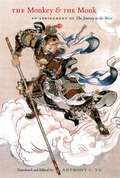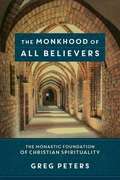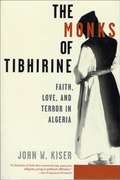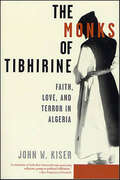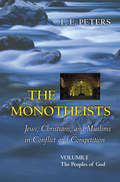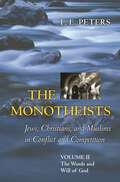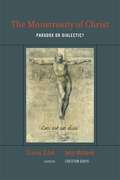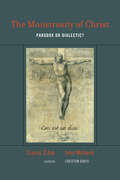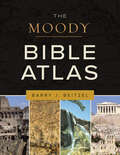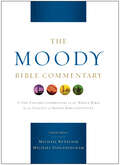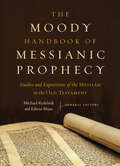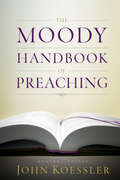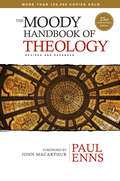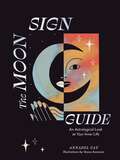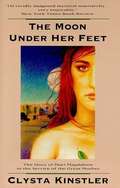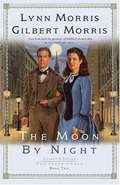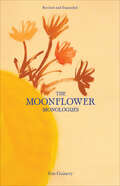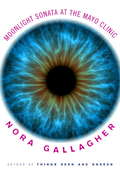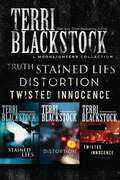- Table View
- List View
The Monkey and the Monk: An Abridgment of the Journey to the West
by Anthony C. YuThe skeletal plot of The Journey to the West (Chin. Xiyoujt) was based on the famous pilgrimage of the priest Xuanzang (596?--664 CE), who traveled overland from Tang China to distant India in quest of additional Buddhist scriptures, the doctrines of which were deemed canonical to his particular division of the faith.
The Monkhood of All Believers
by Greg Peters<p>Although the institution of monasticism has existed in the Christian church since the first century, it is often misunderstood. Greg Peters, an expert in monastic studies, reintroduces historic monasticism to the Protestant church, articulating a monastic spirituality for all believers. <p>As Peters explains, what we have known as monasticism for the past 1,500 years is actually a modified version of the earliest monastic life, which was not necessarily characterized by poverty, chastity, and obedience but rather by one's single-minded focus on God--a single-mindedness rooted in one's baptismal vows and the priesthood of all believers. Peters argues that all monks are Christians, but all Christians are also monks. To be a monk, one must first and foremost be singled-minded toward God. This book presents a theology of monasticism for the whole church, offering a vision of Christian spirituality that brings together important elements of history and practice. The author connects monasticism to movements in contemporary spiritual formation, helping readers understand how monastic practices can be a resource for exploring a robust spiritual life.</p>
The Monks of Tibhirine: Faith, Love, and Terror in Algeria
by John W. KiserBack Cover: "In the spring of 1996 armed men broke into a Trappist monastery in war-torn Algeria and took seven monks hostage. pawns in a murky negotiation to free imprisoned terrorists. Two months later the monks' severed heads were found in a tree; their bodies were never recovered. The village of Tibhirine had sprung up around the monastery because it was a holy place protected by the Virgin Mary, revered by Christians and Muslims alike. But napalm. helicopters, and gunfire had become regular accompaniments to the monastic routine as the violence engulfing Algeria drew closer to the isolated cloister high in the Atlas Mountains." The author shows the different shades of Islam and how Christians and Moslems can live in harmony if they are given the correct set of conditions.
The Monks of Tibhirine: Faith, Love, and Terror in Algeria
by John W. Kiser"The inspiration for the major motion picture "Of Gods and Men"A true story of Christian love set against political terrorism in contemporary Algeria.In the spring of 1996, militants of the Armed Islamic Group, today affiliated with Osama bin Laden's al Qaeda network, broke into a Trappist monastery in war-torn Algeria. Seven monks were taken hostage, pawns in a murky negotiation to free imprisoned terrorists. Two months later, the severed heads of the monks were found in a tree not far from Tibhirine; their bodies were never recovered.The village of Tibhirine had sprung up around the monastery because it was a holy place, protected by the Virgin Mary, who is revered by Christians and Muslims alike. But after 1993, as the Algerian military government's war against Islamic terrorism widened, napalm, helicopters, and gunfire became regular accompaniments to their monastic routine.The harmony between these Christian monks and the Muslim neighbors of Tibhirine contrasts with the fear and distrust among Algerians fighting over power and what it means to be a Muslim. Woven into the story of the kidnapping and the political disintegration of Algeria is a classic account of Christian martyrdom. But these monks were not martyrs to their faith, as preaching Christianity to Muslims is forbidden in Algeria, but rather martyrs to their love of their Muslim neighbors, whom they refuse to desert in their hour of need.
The Monks of Tiron
by Kathleen ThompsonThis book offers the first comprehensive history of the order of Tiron. As a unique survey of the Tironensian experience it sheds new light on traditional assumptions of twelfth-century monastic history. Previous sketches have been shaped by the life of the founder, the Vita Bernardi, which depicts the forests of western France teeming with holy men, and that self-image of hermit preachers in the wilderness has been deeply influential in the historiography of twelfth-century reform. Drawing from the latest advances in the understanding of hagiography and institutional memory, Thompson reinterprets key sources to offer a valuable contribution to the history of monasticism. She outlines the rapid dissemination of the Tironensian approach in the first thirty years of its existence, its network of contacts with the lay elite and the impact on the Tironensians of the successes of the Cistercians and Mendicants.
The Monotheists: The Peoples of God
by Francis Edward PetersThe world's three great monotheistic religions have spent most of their historical careers in conflict or competition with each other. And yet in fact they sprung from the same spiritual roots and have been nurtured in the same historical soil. This book--an extraordinarily comprehensive and approachable comparative introduction to these religions--seeks not so much to demonstrate the truth of this thesis as to illustrate it. Frank Peters, one of the world's foremost experts on the monotheistic faiths, takes Judaism, Christianity, and Islam, and after briefly tracing the roots of each, places them side by side to show both their similarities and their differences. Volume I, The Peoples of God, tells the story of the foundation and formation of the three monotheistic communities, of their visible, historical presence. Volume II, The Words and Will of God, is devoted to their inner life, the spirit that animates and regulates them. Peters takes us to where these religions live: their scriptures, laws, institutions, and intentions; how each seeks to worship God and achieve salvation; and how they deal with their own (orthodox and heterodox) and with others (the goyim, the pagans, the infidels). Throughout, he measures--but never judges--one religion against the other. The prose is supple, the method rigorous. This is a remarkably cohesive, informative, and accessible narrative reflecting a lifetime of study by a single recognized authority in all three fields. The Monotheists is a magisterial comparison, for students and general readers as well as scholars, of the parties to one of the most troubling issues of today--the fierce, sometimes productive and often destructive, competition among the world's monotheists, the siblings called Jews, Christians, and Muslims.
The Monotheists: The Words and Will of God
by Francis Edward PetersThe world's three great monotheistic religions have spent most of their historical careers in conflict or competition with each other. And yet in fact they sprung from the same spiritual roots and have been nurtured in the same historical soil. This book--an extraordinarily comprehensive and approachable comparative introduction to these religions--seeks not so much to demonstrate the truth of this thesis as to illustrate it. Frank Peters, one of the world's foremost experts on the monotheistic faiths, takes Judaism, Christianity, and Islam, and after briefly tracing the roots of each, places them side by side to show both their similarities and their differences. Volume I, The Peoples of God, tells the story of the foundation and formation of the three monotheistic communities, of their visible, historical presence. Volume II, The Words and Will of God, is devoted to their inner life, the spirit that animates and regulates them. Peters takes us to where these religions live: their scriptures, laws, institutions, and intentions; how each seeks to worship God and achieve salvation; and how they deal with their own (orthodox and heterodox) and with others (the goyim, the pagans, the infidels). Throughout, he measures--but never judges--one religion against the other. The prose is supple, the method rigorous. This is a remarkably cohesive, informative, and accessible narrative reflecting a lifetime of study by a single recognized authority in all three fields. The Monotheists is a magisterial comparison, for students and general readers as well as scholars, of the parties to one of the most troubling issues of today--the fierce, sometimes productive and often destructive, competition among the world's monotheists, the siblings called Jews, Christians, and Muslims.
The Monstrosity of Christ: Paradox or Dialectic?
by Slavoj Zizek John Milbank Creston DavisIf the theological was marginalized in the age of Western secular modernity, it has now returned with a vengeance. Theology is reconfiguring the very makeup of the humanities in general, with disciplines like philosophy, political science, literature, history, psychoanalysis, and critical theory, in particular, feeling the impact of this return.
The Monstrosity of Christ: Paradox or Dialectic? (Short Circuits)
by Slavoj Zizek John MilbankA militant Marxist atheist and a “Radical Orthodox” Christian theologian square off on everything from the meaning of theology and Christ to the war machine of corporate mafia. In this corner, philosopher Slavoj Žižek, a militant atheist who represents the critical-materialist stance against religion's illusions; in the other corner, “Radical Orthodox” theologian John Milbank, an influential and provocative thinker who argues that theology is the only foundation upon which knowledge, politics, and ethics can stand. In The Monstrosity of Christ, Žižek and Milbank go head to head for three rounds, employing an impressive arsenal of moves to advance their positions and press their respective advantages. By the closing bell, they have not only proven themselves worthy adversaries, they have shown that faith and reason are not simply and intractably opposed. Žižek has long been interested in the emancipatory potential offered by Christian theology. And Milbank, seeing global capitalism as the new century's greatest ethical challenge, has pushed his own ontology in more political and materialist directions. Their debate in The Monstrosity of Christ concerns the future of religion, secularity, and political hope in light of a monsterful event—God becoming human. For the first time since Žižek's turn toward theology, we have a true debate between an atheist and a theologian about the very meaning of theology, Christ, the Church, the Holy Ghost, Universality, and the foundations of logic. The result goes far beyond the popularized atheist/theist point/counterpoint of recent books by Christopher Hitchens, Richard Dawkins, and others. Žižek begins, and Milbank answers, countering dialectics with “paradox.” The debate centers on the nature of and relation between paradox and parallax, between analogy and dialectics, between transcendent glory and liberation. Slavoj Žižek is a philosopher and cultural critic. He has published over thirty books, including Looking Awry, The Puppet and the Dwarf, and The Parallax View (these three published by the MIT Press). John Milbank is an influential Christian theologian and the author of Theology and Social Theory: Beyond Secular Reason and other books. Creston Davis, who conceived of this encounter, studied under both Žižek and Milbank.
The Moody Bible Atlas
by Barry J BeitzelECPA Medallion of ExcellenceWinner—Cartography and Geographic Information Society (CaGIS) Annual Map Design CompetitionThe Bible is a Story. Do you know its setting?Everything in the Bible has meaning, including its geography. Discover new insights about the biblical and historical sites, culture, and landscapes. God chose a certain land in a particular place. Many Bible passages involve journeys, wars, or other events in unfamiliar places in ancient times. The geographical context is important to understanding these passages.More than just maps, The Moody Bible Atlas reveals the geographical and historical context of the biblical story. Marvel at God&’s provision by journeying with Israel in the wilderness. Size up their enemies by studying portraits of the Egyptians, Canaanites, Assyrians, and others. View maps and pictures of the places Jesus walked. See Paul&’s evangelistic zeal by learning the scope of his missionary journeys. Updates reflect the latest advances in biblical scholarship, linguistics, and archeology. Award-winning maps, new research, and additional commentary make this updated work an indispensable resource for sermon preparation, lessons, and personal Bible study.Key features include:119 full-color maps of Canaan, the Mediterranean, the Near East, Sinai, Turkey, and moreOver 100 all-new color photos of various locations and artifactsComprehensive survey of every location in the Bible— from Eden to Jerusalem to RomeDistinctive theological discussion of Bible geography800+ endnotes for in-depth studyA general reading list for continued researchA Map Citation Index, General Index, and Scripture Citation Index
The Moody Bible Commentary
by James Spencer John Hart Daniel Green Walter White Michael Boyle J. Brian Tucker Kevin D. Zuber Charles H. Dyer David Finkbeiner Bryan O'Neal John Jelinek Louis A. Barbieri James Coakley John K Goodrich John M. Koessler Walter McCord John McMath William H. Marty Eugene Mayhew Winfred Neely Gerald W. Peterman Ron Sauer Harry E. Shields Tim Sigler William D. Thrasher Gerald Vreeland Michael Wechsler David WoodallOVER 100,000 COPIES SOLD!Now you can study the Bible with the faculty of the Moody Bible Institute!Imagine having a team of 30 Moody Bible Institute professors helping you study the Bible. Now you can with this in-depth, user-friendly, one-volume commentary. General editors Michael Rydelnik and Michael Vanlaningham have led a team of contributors whose academic training, practical church experience, and teaching competency make this commentary excellent for anyone who needs help understanding the Scriptures. This comprehensive and reliable reference work should be the first place Sunday school teachers, Bible study leaders, missionaries, and pastors turn to for biblical insight. Scripture being commented on is shown in bold print for easy reference, and maps and charts provide visual aids for learning. Additional study helps include bibliographies for further reading and a subject and Scripture index. The Moody Bible Commentary is an all-in-one Bible study resource that will help you better understand and apply God's written revelation to all of life.
The Moody Bible Commentary
by James Spencer John Hart Daniel Green Walter White Michael Boyle J. Brian Tucker Kevin D. Zuber Charles H. Dyer David Finkbeiner Bryan O'Neal John Jelinek Louis A. Barbieri James Coakley John K Goodrich John M. Koessler Walter McCord John McMath William H. Marty Eugene Mayhew Winfred Neely Gerald W. Peterman Ron Sauer Harry E. Shields Tim Sigler William D. Thrasher Gerald Vreeland Michael Wechsler David WoodallOVER 100,000 COPIES SOLD!Now you can study the Bible with the faculty of the Moody Bible Institute!Imagine having a team of 30 Moody Bible Institute professors helping you study the Bible. Now you can with this in-depth, user-friendly, one-volume commentary. General editors Michael Rydelnik and Michael Vanlaningham have led a team of contributors whose academic training, practical church experience, and teaching competency make this commentary excellent for anyone who needs help understanding the Scriptures. This comprehensive and reliable reference work should be the first place Sunday school teachers, Bible study leaders, missionaries, and pastors turn to for biblical insight. Scripture being commented on is shown in bold print for easy reference, and maps and charts provide visual aids for learning. Additional study helps include bibliographies for further reading and a subject and Scripture index. The Moody Bible Commentary is an all-in-one Bible study resource that will help you better understand and apply God's written revelation to all of life.
The Moody Handbook of Messianic Prophecy: Studies and Expositions of the Messiah in the Old Testament
by Michael Rydelnik and Edwin BlumThe ultimate, all-in-one resource on what the Old Testament says about JesusAs Jesus walked the Emmaeus road, he showed his companions how the whole of Scripture foretold his coming. Yet so often today we&’re not quite sure how to talk about Jesus in the Old Testament. How do you know what applies to Jesus? And how do you interpret some of the strange prophetic language?Get answers and clarity in this authoritative and reliable guide to messianic prophecy from some of the world&’s foremost evangelical Old Testament scholars. In this in-depth, user-friendly one volume resource you get: -essays from scholars on the big ideas and major themes surrounding Messianic prophecy-A clear and careful commentary on every passage in the Old Testament considered Messianic -Insights into the original Hebrew and helpful analysis of theological implicationsWatch the Scriptures come into full color as you see new meaning in familiar passages and further appreciate God&’s masterful handiwork in preparing the way for Jesus, the long-awaited Messiah.
The Moody Handbook of Messianic Prophecy: Studies and Expositions of the Messiah in the Old Testament
by Michael Rydelnik and Edwin BlumThe ultimate, all-in-one resource on what the Old Testament says about JesusAs Jesus walked the Emmaeus road, he showed his companions how the whole of Scripture foretold his coming. Yet so often today we&’re not quite sure how to talk about Jesus in the Old Testament. How do you know what applies to Jesus? And how do you interpret some of the strange prophetic language?Get answers and clarity in this authoritative and reliable guide to messianic prophecy from some of the world&’s foremost evangelical Old Testament scholars. In this in-depth, user-friendly one volume resource you get: -essays from scholars on the big ideas and major themes surrounding Messianic prophecy-A clear and careful commentary on every passage in the Old Testament considered Messianic -Insights into the original Hebrew and helpful analysis of theological implicationsWatch the Scriptures come into full color as you see new meaning in familiar passages and further appreciate God&’s masterful handiwork in preparing the way for Jesus, the long-awaited Messiah.
The Moody Handbook of Preaching
by John Koessler"I can't tell you how many times I have preached and afterward promised God I would never embarrass Him like that again." — Joseph M. Stowell. Unnatural. Supernatural. A gift. Hard work. Exhilarating. Terrifying. These words only begin to describe the challenge and reward each pastor experiences. So what can assist today's pastors in such an endeavor? The Moody Handbook of Preaching. With contributors like Michael Easley, Joseph Stowell, and George Sweeting, these pages will reinvigorate you with an energizing love for preaching. And with topics such as evangelism, homiletics, and historical narrative, this book will equip you to be effective in today's postmodern age. A rich resource, The Moody Handbook of Preaching encompasses the philosophy, formation, and delivery of preaching. Whether you're a seminary student or a seasoned pastor, this book will prove invaluable in your call by God to preach.
The Moody Handbook of Preaching
by John Koessler"I can't tell you how many times I have preached and afterward promised God I would never embarrass Him like that again." — Joseph M. Stowell. Unnatural. Supernatural. A gift. Hard work. Exhilarating. Terrifying. These words only begin to describe the challenge and reward each pastor experiences. So what can assist today's pastors in such an endeavor? The Moody Handbook of Preaching. With contributors like Michael Easley, Joseph Stowell, and George Sweeting, these pages will reinvigorate you with an energizing love for preaching. And with topics such as evangelism, homiletics, and historical narrative, this book will equip you to be effective in today's postmodern age. A rich resource, The Moody Handbook of Preaching encompasses the philosophy, formation, and delivery of preaching. Whether you're a seminary student or a seasoned pastor, this book will prove invaluable in your call by God to preach.
The Moody Handbook of Theology
by Paul EnnsThe study of God, His nature, and His Word are all essential to the Christian faith. Now those interested in Christian theology have a newly revised and updated reference tool in the 25th Anniversary Edition of The Moody Handbook of Theology.In this classic and timeless one-volume resource, Paul Enns offers a comprehensive overview of the five dimensions of theology: biblical, systematic, historical, dogmatic, and contemporary. Each section includes an introduction, chapters on key points, specific studies pertinent to that theology, books for further study, and summary evaluations of each dimension. Charts, graphs, glossary, and indexes add depth and breadth. Theology, once the domain of academicians and learned pastors, is now accessible to anyone interested in understanding the essentials of what Christians believe. The Moody Handbook of Theology is a concise doctrinal reference tool for newcomers and seasoned veterans alike.
The Moody Handbook of Theology
by Paul EnnsThe study of God, His nature, and His Word are all essential to the Christian faith. Now those interested in Christian theology have a newly revised and updated reference tool in the 25th Anniversary Edition of The Moody Handbook of Theology.In this classic and timeless one-volume resource, Paul Enns offers a comprehensive overview of the five dimensions of theology: biblical, systematic, historical, dogmatic, and contemporary. Each section includes an introduction, chapters on key points, specific studies pertinent to that theology, books for further study, and summary evaluations of each dimension. Charts, graphs, glossary, and indexes add depth and breadth. Theology, once the domain of academicians and learned pastors, is now accessible to anyone interested in understanding the essentials of what Christians believe. The Moody Handbook of Theology is a concise doctrinal reference tool for newcomers and seasoned veterans alike.
The Moon Sign Guide: An Astrological Look at Your Inner Life
by Annabel GatFrom Annabel Gat, the author of The Astrology of Love & Sex, comes a fascinating guide that provides a deeper look at Moon signs—the zodiac sign the moon occupied at one's birth.Most casual fans of astrology are familiar with their Sun sign, but your Moon sign is just as essential to your astrological profile. While the Sun sign symbolizes your ego and will, your Moon sign represents your inner world, your emotional landscape—your feelings, memories, and subconscious; your fears, needs, and desires.Organized into twelve chapters, one for each Moon sign, The Moon Sign Guide details the characteristics and personality traits for each sign in relation to key aspects of life, including self-care, home, family, work, friendship, love, and compatibility. The book also includes a glimpse into progressed moons because as you age, your Moon sign changes, providing new emotional perspectives.Illustrated throughout and packaged as a lovely hardcover with foil-stamping and gilded edges, The Moon Sign Guide is an invaluable reference for astrology enthusiasts of all levels and modern mystics looking to explore lunar energies and gain deeper insights into themselves and others.EXPERT AUTHOR: Annabel Gat writes the daily and monthly horoscope column at VICE. She is a practicing astrologer certified by the International Society for Astrological Research.ACCESSIBLE: Organized into twelve easy-to-navigate chapters (from Aires Moon to Pisces Moon), this guide is packed with information that will appeal to astrology fans of all levels. And every two and half years, your progressed Moon sign changes, making this guidebook a handy reference you'll turn to for many years to come.EXCELLENT SELF-DISCOVERY TOOL: Astrology is a wonderful way to further explore and care for yourself and your emotional well-being. By learning about your Moon sign, you learn more about who you are and what you need to feel emotionally secure, safe, and nurtured.EYE-CATCHING PACKAGE: With foil stamping on the cover, silver gilded edges, and vibrant illustrations throughout, this book makes a lovely gift for zodiac lovers and anyone captivated by the powerful and mysterious moon, and an excellent companion to The Astrology of Love & Sex.Perfect for:• Astrology enthusiasts of all levels, horoscope readers, and anyone who can't get enough of all things zodiac• Fans of wicca, mysticism, spirituality, and tarot• Those who enjoyed The Astrology of Love & Sex, The Only Astrology Book You'll Ever Need, and You Were Born for This
The Moon Under Her Feet
by Clysta KinstlerFictional feminist history of Jesus Christ and Biblical events, from the point of view of Mary Magdalene.
The Moon Under Her Feet
by Clysta KinstlerOn the day I was given to the Goddess I awakened before daylight, a strange fluttering inside me. The excitement that had wakened me combined with the cold, and I shivered, pulling my cloak around me. I went outdoors with the milking bowl and breathed in the sweet air. Hanging the bowl on Nadja's tether post, I faced into the dawn breeze and climbed the little rise behind our house. The sparse grass showed weak new growth at the crown of the hill where it lay open to the dew and fight frost of the winter just past. There had been little rain this year or the one before, and though my parents worried about it in their talk, I thought little of it. I saw only that sunny days were better than rainy ones."She was there -- the Morning Star -- just as Grandmother Lili had promised, brilliant in the brightening sky above the far roofs of Jerusalem, and beneath her, just rising over the dark shape of the Temple, the slimmest crescent moon. The cold wind flapped my cloak about me, but I did not feel it, overcome as I was by that heavenly sign. The Goddess was smiling her blessing on my special day, and the moon was under her feet.Presently, chilled, I trudged down the hill and got the bowl. Nadja already stood expectantly on her milking bench watching me with soft eyes. I put two handfuls of oats in her box, and she chewed happily, moving her little jaws and flicking her long ears rapidly. "I told you I would milk for you this morning, Mari, because your hair is just washed for the festival! Now you will smell like a goat," my mother scolded, holding the dark cloud of her hair away from her face while the dawn wind billowed it about her. I pressed my forehead against Nadja's round belly, stripping out the last drops of milk. "Nadja smells good."
The Moon by Night (Cheney And Shiloh: The Inheritance Ser. #2)
by Gilbert Morris Lynn MorrisCheney and Shiloh Irons-Winslow return to New York from their honeymoon in the West Indies eager to resume their careers. Cheney is thrilled with the newly opened St. Luke the Physician Hospital, which she helped design and renovate. To her dismay, however, it soon appears that several surgeries have been compromised and patients are contracting new illnesses rather than getting well. As evidence of foul play mounts, Cheney works feverishly to expose the true villain and reveal the desperate secrets that fuel these crimes. Shiloh is running the Winslow Brothers Shipping Company, but it soon is so well organized that boredom haunts him. Cheney is so caught up in medical emergencies, day and night, that he must visit her at the hospital. Though Shiloh’s nursing experience could alleviate some of the stress, Cheney believes he doesn’t want to return to medicine and determines not to ask for his help. Will her resolve drive a wedge between them? In the Midst of Growing Adversity, Their Love is Put to the Test
The Moonflower Monologues
by Tess GuineryFrom celebrated Australian artist Tess Guinery comes The Moonflower Monologues, her second book of beautifully designed poetry and prose. This collection is many things: an exploration of strength and femininity, an invitation to let things go wrong, a reminder that growth comes in many forms, and an acknowledgment that &“some things can&’t be written in sugar, only salt.&” Some of the writings are extravagant, some are sparse, but all are infused with Guinery&’s introspection, stillness, and kindness.
The Moonlight Sonata at the Mayo Clinic
by Nora GallagherThis taut yet lyrical memoir tells of the author's experience with a baffling illness poised to take her sight, and gives a deeply felt meditation on vulnerability and on what it means to lose the faith you had and find something better. One day at the end of 2009, during a routine eye exam that Nora Gallagher nearly skipped, her doctor said, "Darn." Her right optic nerve was inflamed, the cause unknown, a condition that if left untreated would cause her to lose her sight. And so began her departure from ordinary life and her travels in what she calls Oz, the land of the sick. It looks like the world most of us inhabit, she tells us, except that "the furniture is slightly rearranged": her friends can't help her, her trusted doctors don't know what's wrong, and what faith she has left just won't cover it. After a year of searching for a diagnosis and treatment, she arrives at the Mayo Clinic and finds a whole town built around Oz.In the course of her journey, Gallagher encounters inhuman doctors, the modern medical system--in which knowledge takes fifteen years to trickle down--and the strange world that is the famous Mayo Clinic, complete with its grand piano. With unerring candor, and no sentimentality whatsoever, Gallagher describes the unexpected twists and turns of the path she took through a medical mystery and an unfathomably changing life. In doing so, she gives us a singular, luminous map of vulnerability and dark landscapes. "It's the nature of things to be vulnerable," Gallagher says. "The disorder is imagining we are not."
The Moonlighters Collection: Truth Stained Lies, Distortion, Twisted Innocence (Moonlighters Series)
by Terri BlackstockTerri Blackstock’s bestselling Moonlighters trilogy—now available in one volume! Truth Stained Lies When truth doesn’t make sense, will lies prevail? Distortion A husband’s lies can have deadly consequences. Twisted Innocence Holly Cramer’s past choices have finally caught up to her, but she never expected them to endanger her baby.
